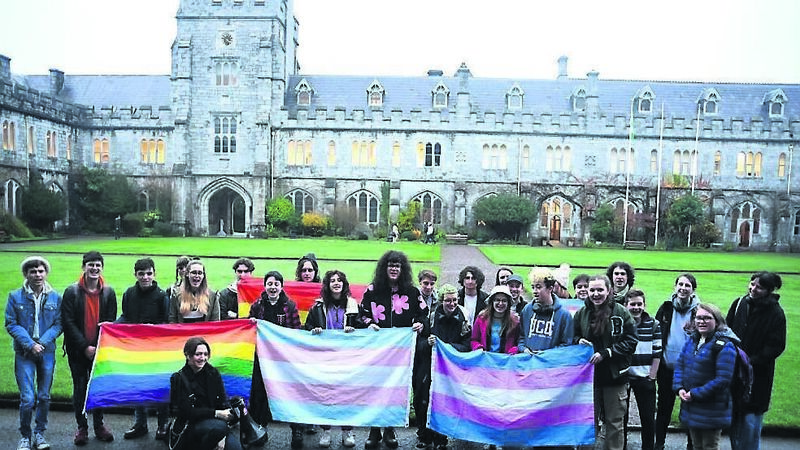Schools must do their homework on how to support trans students

UCC LGBTQ+ Society protest in University College Cork, to highlight a need for more trans healthcare in Ireland. The landscape is not an entirely friendly one for trans youth in Ireland. There are scant services in the country. Picture: Larry Cummins
A representative body for 89% of Irish primary schools last week highlighted its opposition to any teaching of transgender issues to primary school children.
The Catholic Primary Schools Management Association (CPSMA) believes there is a lack of scientific consensus on transgender, and that teaching the topic only adds to “a growing psychological contagion” among children. While similar debates dominate Irish headlines, little attention is given to how schools currently deal with students who might question or reject their assigned sex at birth.
What should happen, for instance, if a 12-or 13-year-old just out of primary school looks to socially transition? What should happen, more specifically, if the child tells the school they are not yet ready to share this identity change with parents? Whatever we might feel theoretically about explaining transgender in class, how should school staff deal with transitioning children in real time?
As things stand, a school may agree to keep a child’s change of identity in school from their parents. According to the existing policy document on the matter Being LGBT in School (2016), produced by GLEN and the Department of Education, the school should listen first and foremost to the child.
In this instance schools are advised to “Reassure the young person that only if school authorities have legitimate cause for concern for the student’s safety would contact be made with the student’s parents/guardians.” As outlined in the document this is to help the child navigate their fear of rejection.
The document states that the school should try and make the experience as positive as possible for the child, something it says is “critical to safeguarding the young person’s mental health and wellbeing; it can also lessen the fears about disclosing to his/her family and friends (Mayock et al, 2009).”
Schools are thereby advised to put a child’s right to privacy above a parent’s right to know. So, whilst the school will not and cannot legally change the child’s name on the register without parental consent, the school will observe but not report the change.
But what if schools make the wrong call? Is 12 or 13 too young to make this decision without wider support, beyond the school? Should an outside agency get involved at this point to support the child and the school?
Has this area become overly political, a battleground for warring liberals and conservatives? Is there an inherent safety concern being overlooked? And perhaps most significantly for school communities, are schools legally entitled to keep such confidences?
In legal terms, the area is murky. Children’s Rights Alliance offers little reassurance.
They point to their guidance for children that “parents or guardian have a right to be kept informed about your education and behaviour in school. This is usually done through school reports, which parents receive once a year, and through parent-teacher meetings or through online systems where parents can log on and see how their child is doing.”
They seem clearer when it comes to the role of doctors working with young people. When asked if a doctor can keep a child’s confidentiality the response is definitive: “No. If you are under 16, your doctor must tell your parents or guardian except in very rare cases.
"Even if you are over the age of 16, the doctor cannot give you a guarantee of confidentiality as your parents or guardian have a right to ask for access to your medical records until you are 18.” However, even here an ambiguity exists, but with a more concerted effort to involve expert services.
“But, if your doctor thinks that it would not to be in your best interests for your parents to know about your visit, they will not tell them…If a doctor or nurse is concerned that you or another child is being harmed in anyway or at risk of being harmed, the law says they must report their concern to the Child and Family Agency, Tusla.”
Gareth Noble, a children’s rights solicitor with a huge amount of experience in child-related litigation, believes schools are being put in an invidious position, between a rock and a hard place, when it comes to deciding between keeping a child’s confidence and the rights of a parent to know. He believes the lack of clarity is unfair to parents, teachers, and students.
“A big part of this relates to age and maturity. For under 16 it is tricky. Age is definite but maturity varies. You might have a very mature 13-year-old and a very vulnerable 16-year-old. In the UK a Gillick test is carried out to ascertain competencies. Who should do that in this case? This is a really important conversation to have in a mature and informed space,” the experienced solicitor says.
“There is very little law and no legal guidance. Following the 2012 referendum on children’s rights, children are legally seen as individual rights holders. Their voice is now central in all proceedings. This means that everything is dealt with on a case-by-case basis.”
Are schools adequately equipped to judge each case? Noble is unsure.
“Who is best placed to judge a child’s competency? There is a great deal of protection for the parent constitutionally. There can only be intervention in a family by the State in exceptional circumstances. The interests of the child trumps. But who decides? Is it reasonable to ask a school to make that call? Do teachers have the expertise and skills to assess that?”
Noble believes that these competing rights need to be addressed to protect everyone involved.
“This is going to happen more and more in schools as children are far more comfortable exploring their identities. I would say we always need to err on the side of caution.”
Despite signing the ‘Being LGBTQ in School’ document, Tusla suggests this is a matter for the Department of Education. “If there is a child protection concern, the school should contact their local duty social worker for advice. This can be done anonymously,” they add.
According to Tusla: “Parents and carers have a right to respect, and should be consulted and involved in matters that concern their family." They also state that “the best interests of the child should be paramount” whilst “the overall aim in all dealings with children and their families is to intervene proportionately to support families to keep children safe from harm.”
And again: “Interventions by the State should build on existing strengths and protective factors in the family.” The question remains: Is it reasonable for a teacher, a school counsellor, or a school principal to withhold this information from a family? Who has the expertise to make this decision?
If a child were to suffer from bullying in the school following their name change, and the parents had been kept in the dark up until that point, might the school be at fault? What if the school were to share such information with parents, causing the child to suffer abuse or rejection?
The landscape is not an entirely friendly one for trans youth in Ireland. There are scant services in the country. Some 234 young people in Ireland were referred to the Tavistock clinic in London for care between 2011 and 2021, an average of 21 a year. The centre is now set to close following concerns over its policies and governance.
One UK survey of trans adults reported lifetime suicidal ideation of 84% and attempted suicide of 48%. A Canadian study of trans youth found that experiences of discrimination, harassment and violence were related to poorer mental health outcomes.
An American study suggests that trans people are more than four times more likely to experience violent assault. Though far more common abroad, Ireland is not without precedent. On January 3 this year Zen Black, a nonbinary tattoo artist was killed in Downpatrick, Co. Down. They were 28 years old.
Earlier this month, a trans woman was attacked in Cork, beaten by men armed with a crutch. Support group Gender Rebels Cork said: “The attack was very likely fuelled by transphobia.” Arguably an outside agency should support a child for this reason alone.
Conversely, supportive schools are seen to increase levels of wellbeing in transgender young people. Might the involvement of an outside agency increase the young person’s anxiety around transitioning?
The Transgender Equality Network offers supports to schools, families, and individuals throughout Ireland. Hannah Solley, Family Support & Education Officer with TENI, believes that the primary focus must be on supporting the child and giving them a safe space to explore their gender identity.
Solley says: “We do not believe that a social transition can happen in school without the parents’ knowledge, although a young person may disclose to someone prior to this time. It’s during this interim that a teacher may be asked to keep this information confidential, until the young person is ready to tell their parents.”
It is less clear how schools should proceed if the young person asks for that confidence to be kept over a longer period of time.
Responding to the issue, a spokesperson for the Department of Education explains that the resource ‘Being LGBT in School’, was published in 2016 as part of the implementation of the 2013 Action Plan on Bullying to assist schools in addressing homophobic bullying and to support LGBT students.
They say that the recently published Action Plan on Bullying, Cineáltas, published in December last, following an extensive consultation process with children, young people and parents includes a commitment to review and update the original ‘Being LGBT in School’ resource. The department believes the implementation of Cineáltas will greatly enhance the work being done to ensure that the safety and wellbeing of all students is at the forefront of everything schools do.
A spokesperson for the department adds: “The Department is committed to creating safe and supportive environments in schools, fostering environments that are welcoming and inclusive for every student, including LGBTQ+ students.”





